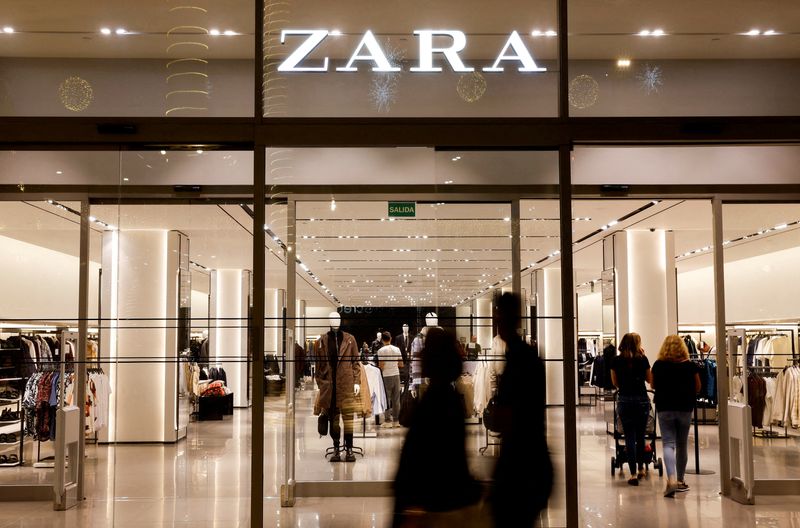By Corina Pons and Helen Reid
MADRID (Reuters) - Investors will closely watch Zara owner Inditex (BME:ITX)'s profit margins for any signs of weakness after a stellar series of results confirmed its lead over smaller Swedish rival H&M.
Inditex, the world's largest fashion retailer, reports results for the February-April period on Wednesday. H&M will give an update on March-May sales on June 15.
Both companies' shares have performed strongly so far this year, gaining 30% and 27% respectively, benefiting from shoppers seeking fashionable clothing that is still affordable.
"The consumer is remaining a bit more resilient than we would have expected last year," said Ciaran Callaghan, head of European equity research at Amundi, Europe's biggest asset manager.
Inditex's higher pricing outside its home market of Spain may have helped its margins, analysts and investors said, but it also makes the retailer vulnerable to a possible strengthening of the euro against other currencies.
An analysis by RBC of 40 Zara garments found prices are at least 60% higher in the U.S. and Mexico versus Spain.
"Inditex's pricing varies quite substantially by market, more so than for H&M," RBC's Richard Chamberlain said in a note to clients on Monday.
That could affect which regions generate the most profit, given Inditex has a big chunk of its costs in euros.
In Saudi Arabia, Inditex's ninth biggest market by number of stores, a pair of high-waisted Zara trousers costs 199 Saudi riyals, or 49.63 euros, while a shopper in Spain or Portugal would pay 25.95 euros for the same garment.
The Zara trousers are between 71% and 91% more expensive in the Gulf states than in Inditex's home market. Inditex does not share revenue or profit per country, so it is unclear the extent to which higher prices boost profitability.
Overall the Middle East is likely to be more important for Inditex now, Chamberlain told Reuters, after the company left Russia, which contributed 8.5% of group profit last year.
Inditex opened 23 new stores across the six Gulf states in 2022, its annual report showed.
"Prices are different by country, but they [Inditex] are going after that universal proposition of high fashion at affordable prices," said Adam Gofton, portfolio manager at Mackenzie Investments in Toronto, which holds shares in Inditex.
Inditex sells Zara garments at higher prices in the Gulf because it believes these markets will tolerate bigger price tags, said Alex Romanenko, head of retail at Pearson Ham Group, a consultancy specializing in pricing.
"As long as Gulf states' economies are performing well, the affluence of this particular segment will be pretty high and therefore this strategy will thrive," said Romanenko.
Zara garments are also sold at a higher price in the United States, where Inditex earlier this year announced a major expansion.

The U.S. presents an opportunity for expansion, Gofton said: there is one Zara store for every 3.4 million people in the United States, compared to one for every 600,000 in France and one for every 150,000 in Spain.
Zara had 98 stores in the U.S. by January 31 2023, according to Inditex's annual report, while H&M has around five times as many.